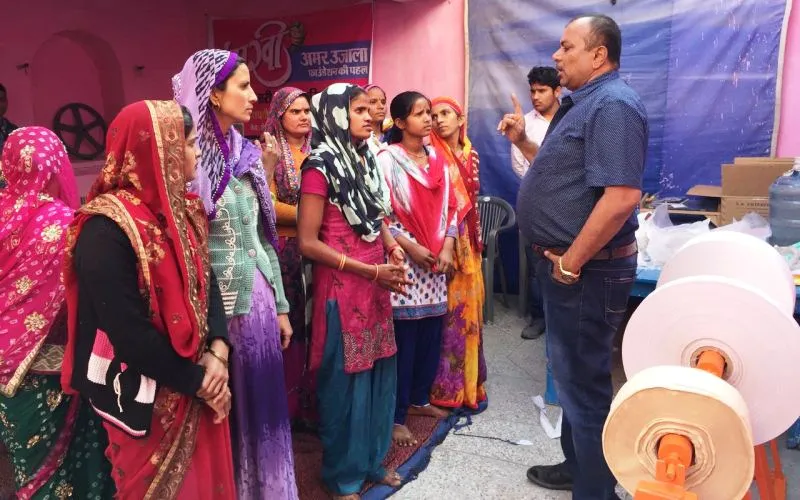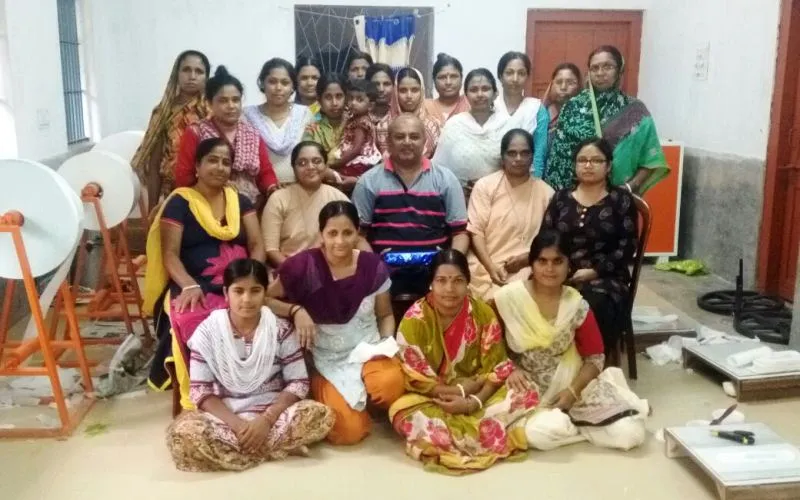Afzal Shaikh’s sanitary napkin machines are providing employment to 400 women
The low-cost machines produce 2,000 pieces every day.

Afzal Shaikh, 49, used to trade in sanitary napkins and baby diapers in Mumbai, Maharashtra. This wholesale business was spread all over India and the work was on in full swing. Later, as the business grew, he thought of diversification and hence started selling the raw materials that go into the making of these products. “People had started using manual machines, so we thought of providing them with the raw materials,” shares Afzal .
But this was not enough to satiate Afzal’s ambition. His experience taught him all the nitty-gritties of this business. He learnt that the machines weren’t cheap—each one was priced at Rs 40,00,000. Adding to the cost was the electricity bill. Hence, the profit turned out to be nil. This necessity led him to invent a low-cost maternity pad machine in 2003.

Revolutionary low-cost machines
As this business flourished, he started working with the National Innovation Foundation (NIF) in Ahmedabad, Gujarat in 2005. This association proved very fruitful. He later went on to invent two more low-cost machines viz. sanitary napkins without wings in 2005 and in 2015, sanitary napkins that don’t require electricity for the manufacturing process. These machines cost around Rs 2–3 lakh only.
The invention of the latter turned out to be a boon. These are India’s first ultra-thin sanitary napkin machines to work without electricity. These machines are capable of manufacturing five sizes. “They are better than any other machines available in the market. We get a good response from all our clients,” Afzal proudly says.
He further adds, “We want to make in India. While earlier these things were imported, today we are manufacturing low-cost sanitary napkins on our soil. There are so many women who are not able to use sanitary napkins because of the high cost. So, we provide these at cheaper rates.”
Employment to 400 women
Afzal’s association with NIF is also providing employment to over 400 women. “We work with NGOs, trusts, women’s jails, and rural and tribal areas to empower women. It creates employment opportunities for these women,” says Jamshi, a fellow at NIF. She further adds, “Afzal spreads hygiene awareness and women empowerment all round the world. His training programmes have been conducted in Nepal and Uganda. Some upcoming programmes are also coming up in some west African countries. NIF plays a big role in it.”

The low-cost machines produce 2,000 pieces every day. Over 56,000 pieces are produced in a month. These are then sold through door-to-door marketing by women’s self-help groups across India. NIF and Afzal’s team also offers a two-day training programme for the women venturing into this business. “We also supervise our customers on CCTV camera for a year without any charge. This helps the manufacturer optimise the produce without much wastage,” shares Afzal.
Afzal’s SA Enterprise along with NIF is working towards the upliftment of women at the grassroots levels. While Afzal gives the training, NIF installs these machines. “We recently gave training to the lady prisoners in one of the jails in Mumbai. We not only taught the manufacturing process but also told them to not let their past overshadow their future,” Afzal proudly shares.
Afzal’s farsightedness and undying spirit are worth a salute.







